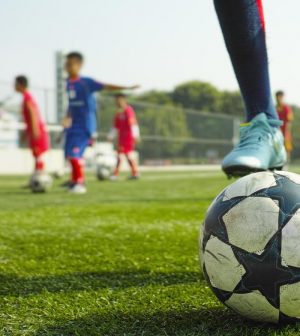- Could Your Grocery Store Meat Be Causing Recurring UTIs?
- Are You Making This Expensive Thermostat Error This Winter?
- Recognizing the Signs of Hypothyroidism
- 10 Strategies to Overcome Insomnia
- Could Artificial Sweeteners Be Aging the Brain Faster?
- Techniques for Soothing Your Nervous System
- Does the Water in Your House Smell Funny? Here’s Why
- Can a Daily Dose of Apple Cider Vinegar Actually Aid Weight Loss?
- 6 Health Beverages That Can Actually Spike Your Blood Sugar
- Treatment Options for Social Anxiety Disorder
Team Sports Score Big Points for Your Child’s Brain, Study Finds

There may be something special about team sports in childhood that helps sharpen a kids’ brain, new research shows.
Children who were on soccer or volleyball teams scored higher on tests of “executive function” — thinking skills needed to organize, remember details, make decisions and stay focused — compared to kids who didn’t play sports or played individual sports only, the new study discovered.
“Scientific data indicate that playing a team sport like soccer improves executive function skills, which are among the most key life skills of all,” Dr. Alison Brooks wrote in a journal commentary accompanying the new study. She’s professor of orthopedics at the University of Wisconsin in Madison.
The new study was published Dec. 17 in the journal JAMA Network Open. It was conducted in The Netherlands and led by Lu Yang, a graduate medical student at the University Medical Center Groningen.
Yang’s team looked at data on almost 900 schoolchildren tracked from 2006 through 2017. The kids were assessed at two age periods: Ages 5 to 6 and then again at 10 to 11.
Data was compiled on their daily physical activity (including sports participation), and they were also given cognitive tests measuring executive function at around the age of 11.
The research showed that “moderate” levels of overall physical activity in early life had no significant impact on the kids’ executive function at age 11.
There was one exception, however.
“Children participating in team sports at ages 10 and 11 years consistently exhibited superior executive function compared with participants in individual sports,” Yang and colleagues reported.
Example of team sports the kids routinely engaged in were soccer and volleyball; individual sports included martial arts, swimming or gymnastics.
How might playing on a team sharpen a kids’ decision-making, organization and other skills?
Team sports place kids under “high cognitive demands,” the researchers noted, “due to uncertainty from interactions with teammates and opponents; thus, players must rapidly and dynamically respond.”
All of this means that “team sports may serve as practice grounds for enhancing executive function,” they concluded.
In her commentary, Brooks noted that the Dutch kids’ participation in group sports was high — only 6.3% of the kids in the study played no sport.
However, U.S. kids can expect to reap the same cognitive rewards from team sports, she believes.
Brooks pointed to a 2019 American Academy of Pediatrics report on the value of organized sports for kids. She said it found benefits to “positive self-esteem and relationships with peers, less anxiety and depression, better bone health” as well as healthier hearts, less obesity and “better cognitive and academic performance.”
Unfortunately, too few American children can reap these benefits, because “according to the 2022 National Survey of Children’s Health, only 53.8% of U.S. children aged 6 to 17 years participated on a sports team,” Brooks said.
By the age of 13, 70% of U.S. kids are playing no sports at all, the data showed.
These stats rise even higher among kids from poorer and minority families, and cost (“pay to play”) could be one big factor, according to Brooks.
There’s also increasing pressure to “professionalize” youth sports, making participation less appealing.
“By creating barriers to both sports entry and sustained sports participation, we may be denying children an opportunity to develop their full and true potential as humans,” Brooks wrote.
She said that, besides being an expert in the value of sports for kids’ health, she’s also a former soccer player and a mom.
“Now is the time for me to drop my child at soccer practice so he can enhance his executive functioning, and while he is at it, maybe learn to bend it like Beckham,” Brooks said.
More information
Find out more about the health benefits of sports for kids at the Mayo Clinic.
SOURCE: JAMA Network Open, news release, Dec. 17, 2024
Source: HealthDay
Copyright © 2026 HealthDay. All rights reserved.










